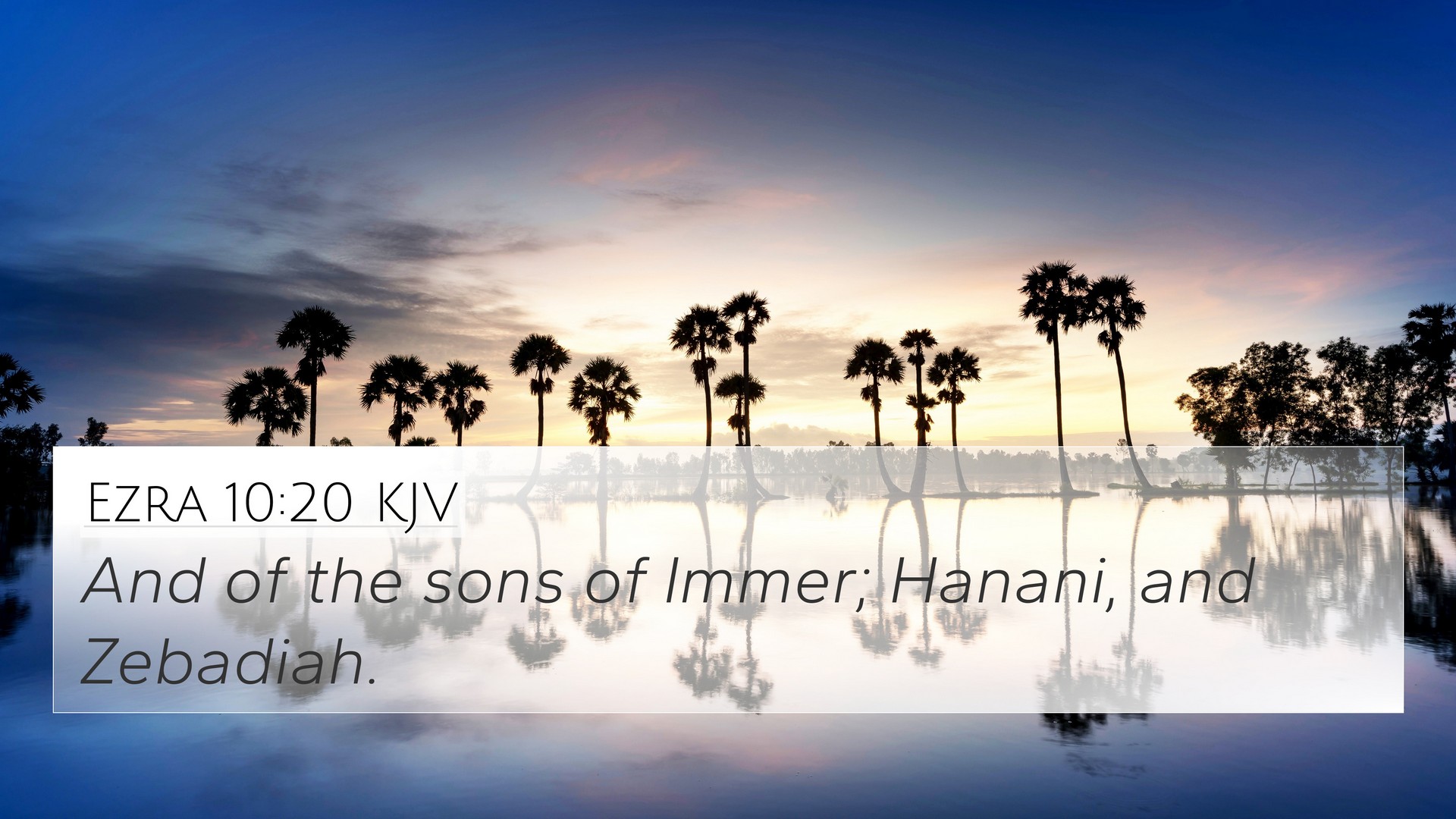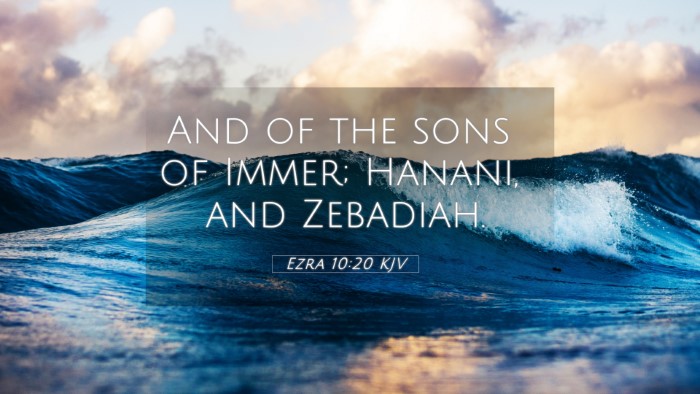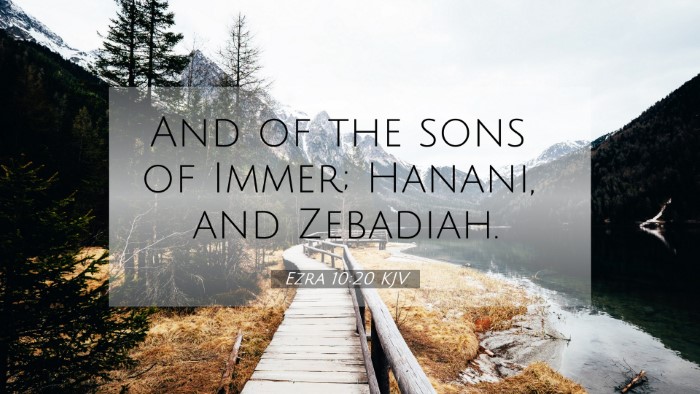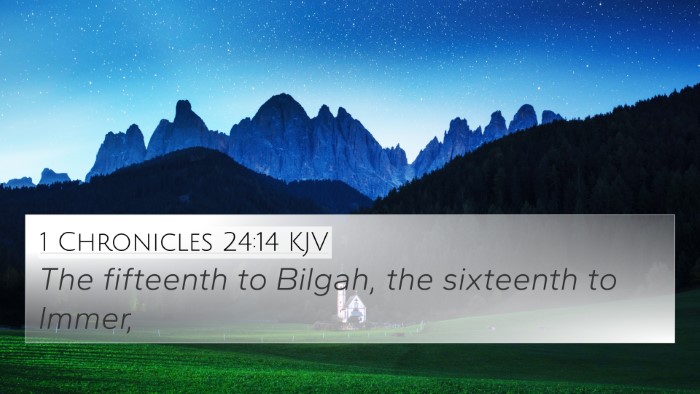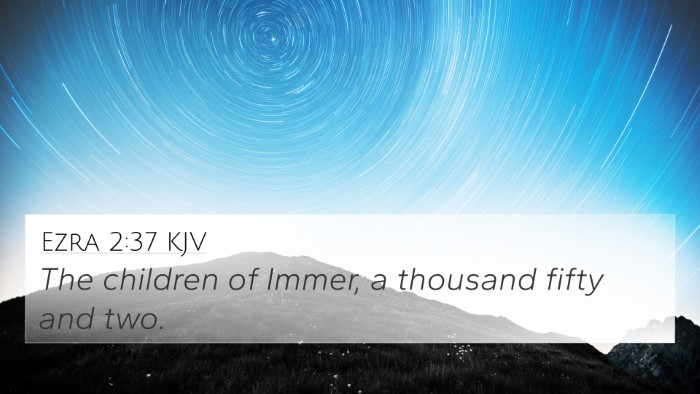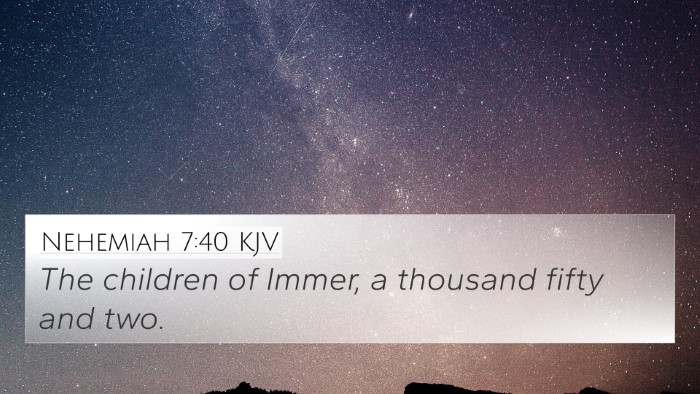Ezra 10:20 - An In-depth Biblical Analysis
Bible Verse: Ezra 10:20 - "And of the sons of Immer; Hanani and Zebadiah." (KJV)
Understanding Ezra 10:20
This verse provides a brief mention of the lineage of those who returned to Jerusalem following the Babylonian exile, focusing specifically on the sons of Immer, identified as Hanani and Zebadiah. In the context of Ezra 10, we see the importance of genealogical records, which played a crucial role in maintaining the identity and purity of the returned community.
Commentary Insights
Matthew Henry's Commentary
Matthew Henry emphasizes that this list serves as a record of those who had married foreign women and were part of the larger call for repentance and reformation post-exile. The act of naming individuals underscores accountability and the communal effort to restore faithfulness to God. The inclusion of Hanani and Zebadiah portrays specific examples of those who must now confront the consequences of their actions.
Albert Barnes' Notes
Albert Barnes notes that the reference to the sons of Immer indicates a broader familial and tribal significance. It illustrates that God's people were called back not individually but as families and clans, which reinforces the idea of corporate responsibility before God. Barnes highlights that this verse may seem trivial but is pivotal in showcasing how even minor details reveal God’s care for His people.
Adam Clarke's Commentary
Adam Clarke provides a closer examination of the names mentioned. He discusses the historical implications of the sons of Immer and how their actions reflect the larger trend of intermarriage within the Jewish community. Clarke believes that the verse demonstrates the importance of maintaining one's heritage and faith, as it lays the groundwork for the community's spiritual health moving forward.
Thematic Connections
Ezra 10:20 serves as a critical juncture for discussing themes of repentance, identity, and restoration. The genealogy highlighted in Ezra mirrors various themes found in the Bible:
- Corporate Responsibility: Similar to Romans 14:7, which discusses how we live for the Lord and are accountable to Him.
- Restoration of Identity: Connecting to Jeremiah 30:3 where God promises restoration to Israel.
- Genealogies in Scripture: Reflecting on Matthew 1, which also emphasizes God’s plan through lineage.
- Importance of Repentance: Draws parallels to 2 Chronicles 7:14, calling for national repentance.
- Purity in Worship: Addresses themes from Malachi 2:10-16 regarding faithfulness in marriage.
- The Importance of Community: Related to Acts 2:42-47, where the early church shows unity and collective identity.
- Intermarriage and God’s Law: Reflected in Deuteronomy 7:3-4 which warns against relationships with foreign nations.
Cross-References for Ezra 10:20
Several other Bible passages relate to Ezra 10:20, reflecting its themes of communal identity and integrity. These connections enhance our understanding of the passage:
- Nehemiah 10:28-29: Discussing the commitments of the people to uphold their covenant.
- Ezra 9:1-2: Where Ezra addresses the issue of intermarriage, indicating the gravity of the sin.
- 1 Corinthians 10:12: A warning about falling into sin, paralleling the consequences faced by the people.
- 1 Peter 1:15-16: A call to holiness, connecting to the need for God's people to maintain purity.
- Hebrews 12:14: Encouragement to pursue peace and holiness among the community.
- Ezra 10:44: Continues the narrative of the resolution to the intermarriage issue.
- Deuteronomy 31:12-13: Similar calls for corporate assembly and commitment to the covenant.
Tools for Bible Cross-Referencing
Utilizing tools for Bible cross-referencing can greatly enhance one’s study:
- Bible Concordance: A useful tool for locating verses based on keywords.
- Bible Cross-Reference Guide: Provides structured references to related verses.
- Digital Bible Study Software: These often include built-in cross-reference features.
- Thematic Bible Study Books: Helps explore specific themes and their connections.
- Bible Reference Resources: Online databases and physical books that compile cross-references.
Conclusion
Ezra 10:20, while a simple mention of two individuals, opens the door to a greater understanding of communal identity, the importance of purity in faith, and the call for collective repentance. By utilizing various Bible study tools and engaging in cross-referencing, believers can uncover deeper insights and connections within Scripture that collectively inspire adherence to God's commands and foster spiritual growth.
Final Thoughts
As we study Ezra 10:20, let us remember the importance of our spiritual lineage and the responsibility we hold as members of the body of Christ. Reflecting on the narrative of Ezra aids us in recognizing the value of community in our faith journey and the significance behind every detail in God's Word.
